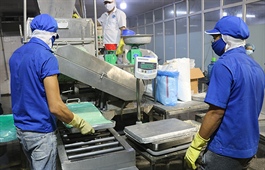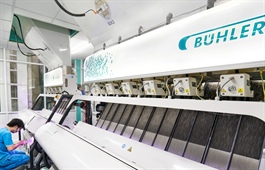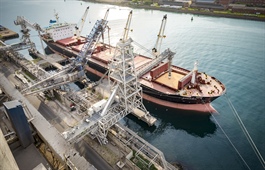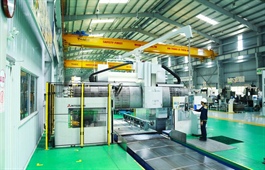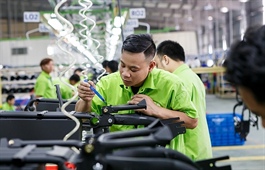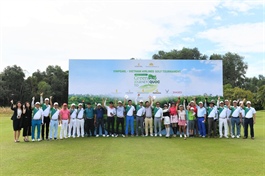Nestlé increases Vietnam investment to tap sustainable development potential
Nestlé increases Vietnam investment to tap sustainable development potential
Switzerland’s Nestlé, the world’s largest FMCG and food company, established a presence in Vietnam 1995. It has more than 2,200 employees in its four factories and two distribution centers. Three of the four factories are in Dong Nai province and the remaining one in Hung Yen Province. It is the biggest Swiss investor in the country at around US$730 million.
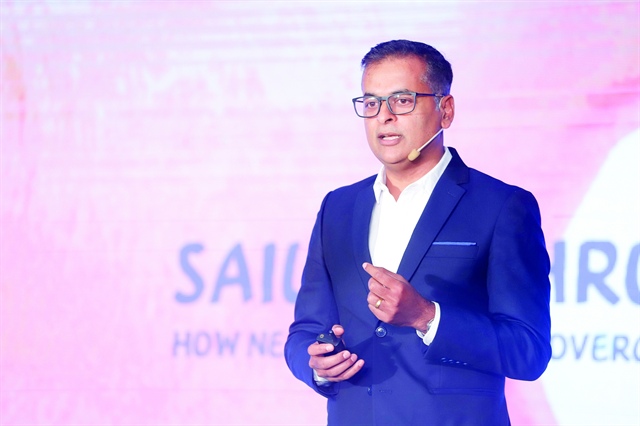
Binu Jacob, managing director of Nestlé Vietnam |
Binu Jacob, managing director of Nestlé Vietnam, says Vietnam’s potential for sustainable growth has prompted the company to continuously step up its investment in the country.
He said the company plans to build on its fruitful 25-year presence in the country to make it a regional and international hub for packaged food.
Vietnam was already a global hub for electronics and apparel, so the company saw no reason a similar feat cannot be achieved in packaged food, particularly high-value coffee, he argued.
To achieve its vision, Nestlé Vietnam has decided to invest US$132 million over the next two years to double the processing capacity of high-quality coffee lines at the Nestlé Tri An factory. This will make it one of the largest coffee export factories in the world, supplying premium products to many developed countries including Japan as well as North American and European nations.
The Swiss conglomerate is currently the largest coffee buyer with a total purchase value of about 20-25 percent of Vietnam’s total coffee output per year, injecting US$700 million every year into the rural economy through the purchase of sustainable coffee from Vietnamese farmers.
The company has been recognized with several awards and recognitions for being a significant contributor to sustainable and inclusive growth in Vietnam.
These include: “Prestigious Exporter 2020” certificate by the Ministry of Industry and Trade; a Top 3 Sustainable Enterprises in 2020 in the manufacturing sector; the National Gold Quality Award (in its very first year of participation); Outstanding Typical Enterprise in Well-being in the Workplace in 2021; and a Certificate of Merit from the Vietnamese Prime Minister in recognition of its achievements and contributions to socioeconomic development and charity. In fact, Nestlé Vietnam is the only foreign direct investment (FDI) enterprise in the coffee industry recognized by the Ministry of Industry and Trade.
Furthermore, with double-digit growth for many consecutive years, Nestlé Vietnam has been repeatedly honoured as the investor with the highest tax payroll achievement in Dong Nai Province.
Over the last more than 25 years in Vietnam, the company has sought to fulfil its mission of ‘Improving the quality of life for Vietnamese people’ through high quality products and services that meet different needs of Vietnamese consumers and to further contribute to the overall socioeconomic development of Vietnam through its sustainability programs.
At Nestlé Vietnam, the sustainable growth engine is established based on the pillars, including “Digital Transformation”, “Innovation - Consumer focus” and “Sustainable development”. In particular, “Digital Transformation” is defined as the process that covers the entire operating mechanism of the company, helping create a foundation for growth, promote flexibility and efficiency in process management and operation. This contributes to sustainable development of the enterprise and the community.
With the goal of applying Industry 4.0 technology to production and operation, at the Nestlé Bong Sen factory (Hung Yen) alone, more than 40 internal applications have been created to help employees store data and systematize processes previously done entirely by hand.
This activity not only saves half the amount of paper used compared to before, reducing carbon dioxide (CO2) emissions into the environment, but also helps cut up to 60 percent of non-value-added activities, improving operational efficiency and saving up to 10 million kWh of electrical energy consumption annually.
Jacob said: “To successfully implement digital transformation, businesses need to have the right strategy and investment as well as prioritize the application of new technologies such as AI, big data, etc. to fashion business analysis tools that generate efficiency and increase profits for businesses.
“It is important that the leadership’s thought and a clear technology development roadmap combine with staff capacity building to adapt to this transformation. Ultimately, it is about applying the right model and choosing the right technology for the size and development of the business.
“We have been doing this by being a ‘Glocal’ company, bringing the best of Nestle’s global technologies and global science with a deep understanding of what Vietnamese consumers really need, and accompanying the local community on its road towards long-term and sustainable growth.”
Environmentally friendly moves
Nestlé Vietnam was honored by the Ministry of Natural Resources and Environment at the “Vietnam Environment Award Ceremony” in 2020 for its achievements in environmental protection in the 2017-2019 three-year period.
As a leading corporation in the world, Nestlé has made strong commitments and taken firm action to protect the planet and preserve resources for the future.
It has developed a roadmap to reduce CO2 emissions in stages, towards net zero CO2 emissions by 2050 across its operations and supply chain.
By 2025, Nestlé expects 100 percent of its packaging to be recyclable or reusable.
In addition, Nestlé is the first company in Vietnam to use FSC-certified paper straws in instant drinks like Milo, Nesvita and Nestlé milk. It is expected that by mid-2022, 100 percent of Nestlé’s instant drink products will switch to using environmentally friendly straws. This initiative of the company will contribute to reducing nearly 700 tonnes of plastic waste used in production each year.
La Vie Company, a member of Nestlé Group, has launched a natural mineral water product line using recycled plastic bottles (rPET). The company also puts recycling instructions on product packages like Milo and La Vie to urge consumers to increase recycling and reduce plastic waste.
Wishing to contribute to a green, clean and beautiful Vietnam, Nestlé Vietnam and La Vie have joined hands with leading companies in the field of consumer goods and packaging to co-found the Vietnam Packaging Recycling Organization (PRO Vietnam) with the goal of promoting a circular economy, turning waste into a resource instead of releasing it into the environment. Nestlé is also an active member of the Global Plastics Action Partnership Program (GPAP) and the National Plastics Action Partnership Program (NPAP).
Since 2015, all Nestlé factories in Vietnam have completed the goal of zero waste in landfills through recycling, reuse and heat recovery of 100 percent of waste in production activities.
Typically, Nestlé has applied the circular economy model in coffee production at the Nestlé Tri An factory: 100 percent of coffee grounds after production is reused as biomass energy; biomass energy has replaced 74 percent of the original fuel source to operate the plant’s boiler, thereby cutting CO2 emissions by an average of more than 13,200 tonnes per year.
In 2021, Nestlé Milo collaborated with the Ministry of Natural Resources and Environment to launch a “Say no to plastic straws” campaign, calling on 98 million Vietnamese people to take action to combat plastic waste.
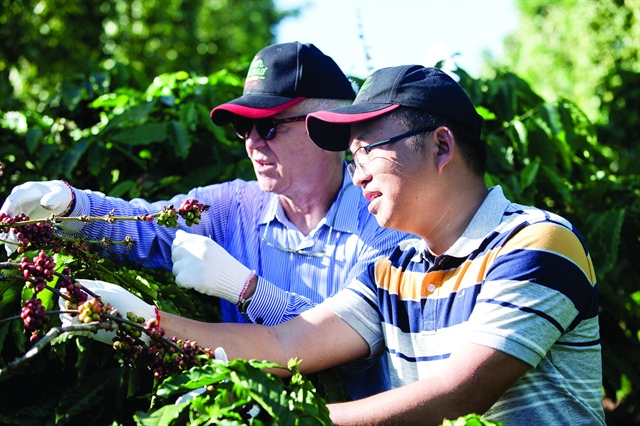
Nescafé Plan’s farming expert (right) guides Swiss Ambassador to Vietnam Ivo Sieber how to pick coffee in the Central Highlands. The Swiss conglomerate Nestlé is currently injecting US$700 million every year into the rural economy through the purchase of sustainable coffee from Vietnamese farmers. |
Pandemic response
Ever since the first COVID-19 outbreak happened in 2020, Nestlé Vietnam has engaged in many practical, meaningful activities to strengthen the nation’s response.
These activities have supported the government, doctors, nurses, volunteers, disadvantaged groups, business partners and employees.
Meanwhile, the company has promoted an active and healthy lifestyle with programs like “Stay Healthy, Stay Positive”, “Be Loved Saigon’s Streets”, “Zero Dong Market” and “Millions of wellbeing bags.”
All Nestlé Vietnam staff memberfs have been offered vaccination, health and safety advice and infection prevention guidance. The company supports a home office setup for all office staff as well as a fully-equipped stay-at-work model for factories.
In April, the company was awarded with a Certificate of Merit signed by Vietnamese Prime Minister Pham Minh Chinh, recognising its contributions in supporting the government in COVID-19 prevention.
Also this year, Nestlé Vietnam has contributed US$174,000 to the COVID-19 vaccine fund in Dong Nai, Hung Yen, and Long An provinces, and supported a dozen COVID-19 treatment hospitals and quarantine centers in Ho Chi Minh City and Dong Nai with medical devices worth US$43,500.
A donation of over 1.8 million Nestlé nutritional items valued at just over US$1 million was also handed out to more than one million people working in the frontline, quarantined and hospital patients, pandemic-hit workers and poor people through the Fatherland Front, provincial labor unions, media partners, charity organizations, and other local and central governmental bodies.
Until now, Nestlé Vietnam has supported the nation with US$2.8 million in-kind and in-cash to combat the pandemic.
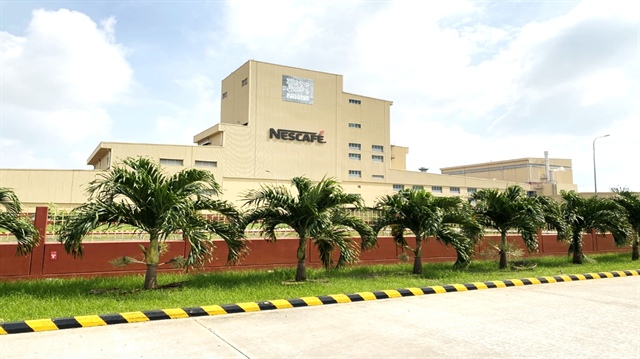
Nestlé Tri An factory |
Vietnam’s attractions
Vietnam’s attractive features begin with its political stability and flexibility. This is one factor that FDI companies like Nestlé look for when they invest, Jacob said, adding that the Vietnamese government was decisive and “doesn’t hesitate to take bold actions whenever required.”
“Its strategic location was another advantage. Located in the heart of South East Asia and having a long coastline, Vietnam presents numerous advantages in providing access to the world’s major trade routes. Its sizeable young population is yet another important advantage”, Jacob added.
“Vietnam’s regional and global economic integration has been proceeding at a fast pace, generating favorable conditions for business. In recent years, the Vietnamese government has very successfully boosted international economic integration through participation in many free trade agreements/communities such as the World Trade Organization (WTO), the Eurasian Economic Union, the European Union, and the ASEAN Economic Community (AEC)”, he noted.
“Despite all the COVID-19 challenges, we believe in the future of Vietnam as a global and regional manufacturing hub and we are increasing our sustainable investments here,” Jacob said.



